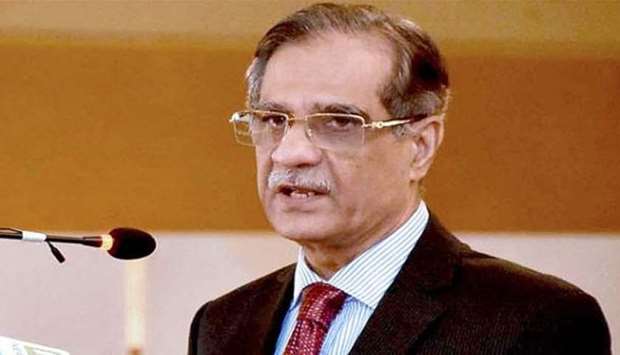Strong observations made by the chief justice of Pakistan in the fake bank accounts and money laundering case has put the ruling Pakistan Tehreek-e-Insaf (PTI) on the back foot, as it cancelled the much-hyped visit to Sindh of the federal information minister.
Minister Fawad Chaudhry was supposed to seek support for dislodging the Pakistan Peoples Party (PPP) government in the province.
As Chief Justice of Pakistan Saqib Nisar declared in the morning that the Supreme Court would strike down any “unconstitutional” attempt to impose governor’s rule in the province, PPP chairman Bilawal Bhutto Zardari told reporters in Karachi in the evening that, if permitted by party co-leader Asif Ali Zardari, his party could “dislodge” the PTI government within a week.
The turn of events led to Prime Minister Imran Khan holding fresh discussions with party leaders at the Prime Minister’s Office.
The meeting decided to shelve the two-day visit of Minister Chaudhry to Karachi.
However, sources said the PTI-led federal government would stick to its plan to weaken the PPP government in Sindh by contacting other political groups as well as demanding the resignation of Sindh Chief Minister Murad Ali Shah.
As Chief Justice Nisar had also taken serious note of the travel ban imposed by the federal government on 172 persons named in the report of a joint investigation team (JIT) looking into the fake accounts and money laundering allegations, the government also decided to reconsider the issue in the federal cabinet meeting to be held today (January 2).
“The prime minister cancelled my visit to Karachi to reject an impression that the Centre wanted to dislodge the PPP-led government in Sindh,” Chaudhry told a press conference while giving details of Prime Minister Khan’s meeting on the Sindh situation.
“My visit to Karachi could further increase political temperature in the country. That is why the prime minister decided that I should not go there at this stage,” he added.
Chaudhry said that the anger shown by the chief justice indicated that the federal government was seen as wanting a change in the provincial government set-up.
“I cancelled my scheduled meeting with leaders of allied parties in Sindh out of respect for the chief justice,” he said.
The minister said the PTI government neither wanted to impose governor’s rule nor to dislodge the PPP government in Sindh.
He said it is the media that gave an impression that the PTI wanted to topple the provincial government.
Chaudhry added, however, that a desire for change was coming out of the Sindh Assembly, as many lawmakers wanted to get rid of the PPP-led government.
“We do not want to interfere in Sindh, but stick to our demand that Chief Minister Murad Ali Shah should resign as he can influence the investigation into fake bank accounts and money laundering case,” he said.
In a veiled defence of the decision to put Shah’s name on the Exit Control List along with 171 others, Chaudhry said that while it does seem awkward, he cited the case of a wanted ex-finance minister who fled by becoming part of former prime minister Nawaz Sharif’s entourage, as well as other examples.
“Ishaq Dar, former ambassador of Pakistan to the US Hussain Haqqani, and former chairman of the Securities and Exchange Commission of Pakistan (SECP) have left the country and did not return to avoid facing their cases,” he added.
According to a new plan, the provincial PTI leadership would contact various political groups, including factions of Jeay Sindh Tehreek, to put pressure for the change of the Sindh chief minister.
“It is less likely that the task will be handed over to any federal minister. The Sindh governor and PTI members of the Provincial Assembly (MPAs) will contact nationalists in Sindh to put pressure and demand the chief minister’s resignation,” a PTI source said.
Without involving the federal government, these groups would hold press conferences and agitations to highlight their demand.
The PPP has 99 members, and the PTI and its allies have 64; the PTI would need 18 more for a majority in the provincial assembly.

Chief Justice of Pakistan Saqib Nisar
